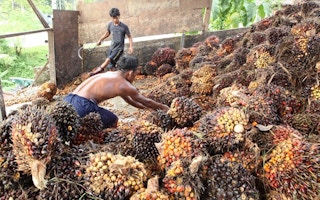Civil society groups are calling for the palm-oil sector’s primary certification body to follow up on an investigation by the Wall Street Journal which provides evidence of slavery on plantations owned by Felda Global Ventures, a Malaysian agribusiness giant with links to the government.
A Journal article published Sunday suggests that Southeast Asia’s palm-oil sector might be a major pull factor behind the Asian migrant crisis, which has been well-documented since Thai and Malaysian authorities began turning up mass graves and camps from human trafficking several months ago.
The International Organization for Migration estimates that 25,000 Southeast Asian migrants, mainly Rohingyas fleeing persecution in Myanmar and Bangladeshis, took to the seas in the first three months of the year.
The Journal article features the account of a young Bangladeshi, Mohammad Rubel, who said a human smuggler lured him abroad with promises of well-paying plantation work, and then subjected him to beatings and abuse during a horrific sea voyage to southern Thailand, where he was held for ransom in a jungle camp until relatives could buy his freedom.
After that, Rubel’s captors marched him into Malaysia and turned him over to different operatives who took him to the town of Jempol, where a contractor supplying Felda with labor gave him a job.
Rubel and other migrants working for Felda in Jempol told the Journal of being forced into debt-bondage and being denied pay for months while working seven-day weeks. They also had to spray the toxic weed-killer Paraquat without protective gear and procure necessities from exploitative company stores.
“
We are calling on the RSPO to openly investigate The Wall Street Journal’s findings.
Sonja Vartiala, Finnwatch Executive Director
Rubel echoed other migrants when he said he was afraid to protest because he was in Malaysia illegally and his employer held his passport.
“There is no escape,” a migrant called Muhi told the Journal. “They bring policemen and threaten to send us to jail.”
Said Rubel, “If I had known what was waiting, I would never have left home.”
The gravest abuses were described by employees of Felda’s contractors, but even workers directly employed by Felda said they weren’t given compensation if accidents occurred. A man who had his leg run over and broken in several places by a tractor, for example, said he had had to pay for much of his medical care himself.
In a statement issued Monday in response to the investigation, Felda reiterated company policies obliging it to do right by its employees and invited the Journal to “share details of these individuals and locations in order for us to investigate these isolated incidents.”
“We also question why [the Journal] is targeting [Felda] in its report when most plantation companies employs[sic] foreign workers,” Felda added.
In a statement issued Tuesday, the Roundtable on Sustainable Palm Oil (RSPO), a voluntary certification scheme of which Felda is a founding member, said it would discuss the case today.
“The RSPO is taking this matter very seriously and has already contacted the source of the report and the company in order to gather more information and further the investigations on the case,” the RSPO said.
Malaysian palm oil is on the US State Department’s “List of Goods Produced by Child Labor or Forced Labor,” under both categories.
Indonesian palm oil is only included under the child labor category, but a 2013 investigation by Bloomberg Businessweek revealed “widespread abuses of basic human rights” in “a tightly controlled system of forced labor” on 12 plantations in Indonesia. The article honed in on Kuala Lumpur Kepong, a Malaysian palm-oil giant with operations in Indonesia.
Although the Journal focused on a single Malaysian town, “this is definitely happening more broadly,” said Robin Averbeck, a senior campaigner with Rainforest Action Network, a US-based NGO.
A variety of reports on labor rights violations in the sector have been released in recent years, including one in 2014 by Finnwatch, a Finnish civil society organization focusing on corporate responsibility, which found serious abuses in Malaysian palm-oil giant IOI Group’s plantations.
“We are calling on the RSPO to openly investigate The Wall Street Journal’s findings,” Finnwatch Executive Director Sonja Vartiala said in a statement. “If the open investigation confirms the findings … the RSPO must uphold its own Principles and Criteria and suspend Felda’s membership until these very serious violations are proven to be remedied.”
The US State Department recently upgraded Malaysia from the lowest rank on its annual Trafficking in Persons report, a move that has been criticized as a politically motivated gambit in order to get Malaysia into the Trans Pacific Partnership, a free trade pact now being debated. US Senator Bob Menendez called the upgrade a “clear politicization of the report.








